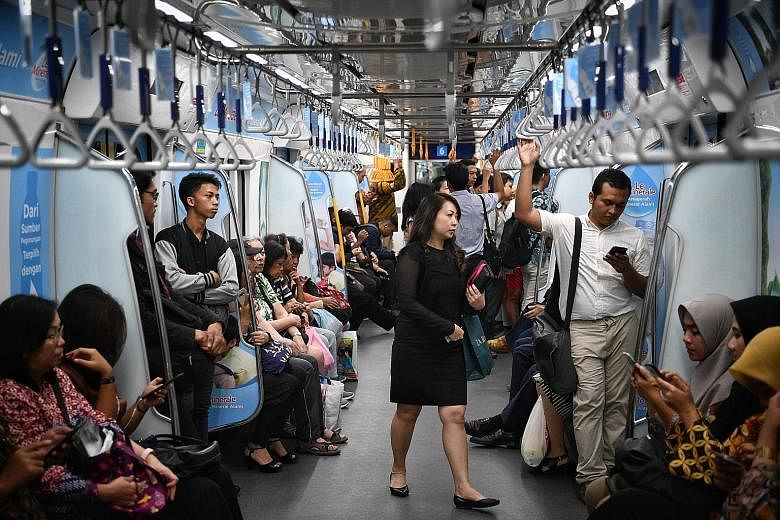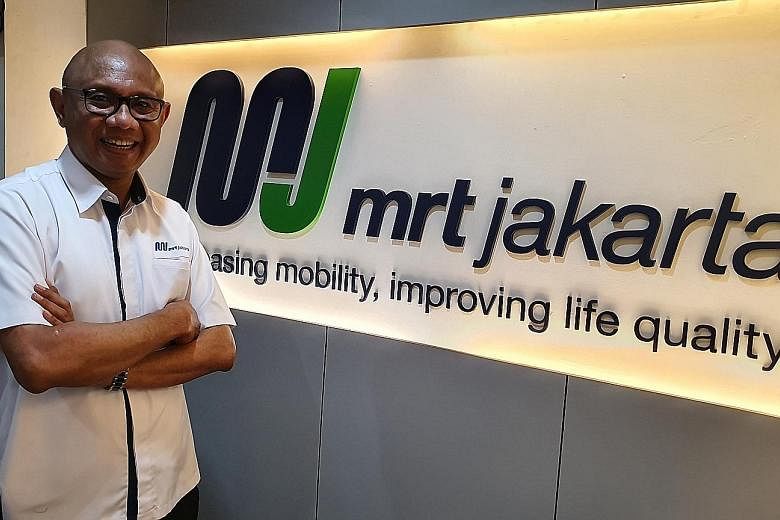No buskers belting out the latest dangdut songs while strumming their guitars, no hawkers carrying baskets of fish crackers, and no passengers sitting on the floor picnicking on packets of nasi campur or mixed rice.
Instead, people queue to buy tickets, give way to others when they board and alight the trains, and refrain from eating, drinking, littering - and even smoking.
With 23 prohibited acts prominently displayed on train posters, Jakarta's eight-month-old mass rapid transit (MRT) system - and Indonesia's first subway service - has emerged as the gold standard of traffic order and discipline in a city notorious for its road congestion, noise and pollution.
"Actions will lead to a change in habits and culture," Dr William Sabandar, president director of PT MRT Jakarta, told The Sunday Times in an interview last Tuesday. "You can behave however you want outside the MRT station, but once you are in the station, you follow the rules," he added.
And change they did "in a matter of a week", noted Dr Sabandar, who said he and his staff had issued warnings to commuters for various offences, from standing on the seats and leaning against the doors to pressing the emergency buttons.
"They want to see change, and they see the MRT as a symbol of change of how public transport and public facilities are being used," he said, beaming.
Since the launch in March this year of its first 16km route from Hotel Indonesia, in the heart of the capital, to Lebak Bulus, in the south, the operator has drawn some 91,000 commuters to use its train service every day, exceeding its target of 65,000 daily users in the first year.
-
91,000
-
Number of commuters who use Jakarta's MRT every day, exceeding its target of 65,000 daily users in the first year.
The city-owned operator is now on track to develop its second phase in March next year through December 2024. The route will span 8.3km with seven underground stations connecting central Jakarta to west Jakarta.
Other future plans include building the East-West and loop lines, as well as transit-oriented development that will integrate the train stations with neighbouring buildings and other transportation modes such as buses and motorcycle taxis.
The response was "beyond expectations", said Dr Sabandar, who noted that many people had earlier doubted the MRT could become an efficient and reliable form of transport in the country.
Various events had marked the subway's short history. In July, President Joko Widodo and defeated presidential candidate Prabowo Subianto took a ride together on the MRT, in a show of reconciliation after a bitterly contested presidential election in April. In September, student rallies against a graft law in the capital led to a surge in ridership, to over 100,000 people a day.
Then there were also unexpected disruptions such as earthquakes and a power outage, said Dr Sabandar, adding: "During the quake, we had to stop the train for a while until the shaking ended. When there was a power supply cut, we used mobile power generators and evacuated the people."
Now, the operator is bracing itself for the monsoon season which often unleashes massive floods. Crisis simulations and staff training are being carried out during the wee hours to anticipate heavy downpours.
"We must check that the mobile power supply sets and the pumps are in working order. Water getting in (the stations) is fine, but if you don't pump it out, that will create problems," said Dr Sabandar.
Mr Muhammad Kamaluddin, MRT Jakarta's corporate secretary division head, said the operator has raked in revenue of 190 billion rupiah (S$18.4 million) since March from ticket sales, and more than 200 billion rupiah from non-ticket sales such as advertisements, retail and naming rights for the stations.
To encourage more commuters to leave their vehicles at home and take the MRT, it has tied up with organisations and companies to hold events such as music tours and free dental checks, as well as build community library corners.
Sales manager Citra Lestari, 43, said she "permanently switched" from driving to taking the train to work in downtown Jakarta around two months ago after her car broke down.
"I had my reservations. Will the train break down? Will the passengers push me around? Will I be late for work?" she told The Sunday Times. "But the journey turned out to be very comfortable. The train came on time, the air-conditioning worked, and people were well behaved, no running or pushing. It feels like taking the subway in Singapore or Hong Kong," she added.
Despite the praises, Dr Sabandar is not taking the train's efficiency and rising popularity for granted. During his daily commute on the train, he talks to passengers to find out how the service could be improved. He also regularly goes to the train depot to personally check that the system is running smoothly.
He and his staff must lead by example, he said, adding: "MRT is about discipline - the train cannot be late; our staff all have to stand on the trains, not sit, as sitting is for passengers.
"We are running at 99.8 per cent on-time performance. We are really putting safety and security at the top of our priorities."


